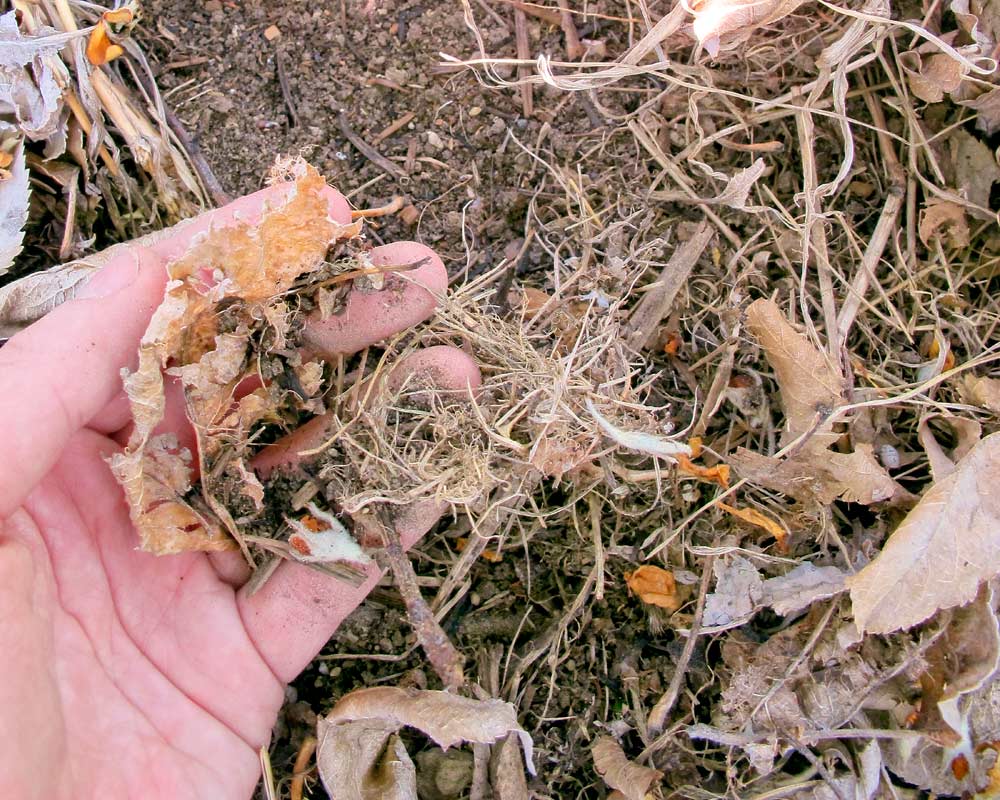
Washington State University extension specialist Tianna DuPont holds a layer of mulch created by “mow and blow” grass clippings, giving the soil in this Royal City, Washington, orchard more than 2,000 microscopic beneficial insects per square meter. DuPont is charting soil biology as part of her research project attempting to measure soil health as it relates to fruit production. (Courtesy Tianna DuPont)
So, soil matters. Now what?
A Washington State University Extension specialist is trying to answer that question through research tying soil characteristics to fruit production in the irrigated West.
“Which of these many, many (soil health) indicators are actually ones that we should be measuring, which of them are more important to tree fruit systems, is kind of the question we are trying to tackle,” Tianna DuPont, Washington State University Extension specialist.
She spoke to growers in January at the Washington Tree Fruit Research Commission’s 2018 Apple Research Review in Pasco, Washington.
DuPont is in the second of three years of her research project, funded by a $152,000 grant from the Research Commission. Lee Kalcsits, a plant physiologist and DuPont’s colleague at the Washington Tree Fruit Research Center in Wenatchee, is working with her.
It’s clear soil makes a difference, DuPont said. Most growers concede that point to varying degrees. Unraveling the mysteries below the orchard floor is one of the primary goals of the fruit industry.
A soil specialist is one of the six WSU endowed chair positions tied to the industry’s $32 million endowment, while the topic comes up at nearly every winter meeting.
But how it matters and, more importantly, what growers should do about it are not as clear. “We have data in other systems supporting this idea,” DuPont said in a follow-up interview. “But in tree fruit we still need the data to show which, if any, soil health indicators are important.”
So far, there is no equivalent to a starch scale for dirt.
The project
Last year, DuPont and Kalcsits sampled 47 apple plots all over Central Washington to measure 21 soil quality indicators, including active carbon, water infiltration rate and surface compaction. They have analyzed samples in the fields and in their Wenatchee laboratory and sent some samples to soil health labs at Cornell University and Oregon State University.
They don’t have all the answers yet, but so far, they have linked soil quality to higher production. In their first year’s number crunching, they combined the 21 measurements into a single soil quality “score.”
Growers collaborating with them typically considered the blocks with higher soil scores as more productive. In fact, yields — after accounting for downgraded and culled fruit — indeed were higher in those sites.
The trend held for Gala and Granny Smith blocks, but Honeycrisp production did not seem to differ between high and low soil scores. They aren’t sure why, DuPont said. As part of the project, Kalcsits is tracking the same soil measurements against incidences of bitter pit and sunburn.
With more work, they hope to determine which of those soil characteristics have the most effect on fruit and are therefore most important to measure. They are open to suggestions, she said.
“We have quite a ways to go,” DuPont said.
Hot topic
Soil health is one of the industry’s hot topics.
Growers agree nutrition matters, but not all are on board with overall soil quality, said Mike Omeg, a cherry grower in The Dalles, Oregon. Too many view soil as simply a stagnant balance of chemicals and not its own biological system that interacts with plants in intricate ways. “It’s just tough, so folks tend to focus upon these simple chemical tests,” Omeg said.
Omeg is known for hosting soil trials and using a variety of soil health techniques such as mulching and “mow and blow” orchard floor management.
Even the term “soil health” is poorly defined, said Mike Robinson, Double Diamond Fruit partner in Quincy, Washington, and one of the industry’s most vocal proponents of increased soil research.
“I’m a bit uncomfortable with the term ‘soil health,’” he said. “First, we need to define what healthy soil is. Most of the definitions I’ve seen are built on rather shaky scientific foundations and reflect our lack of knowledge in this area. It’s as much a buzz term as a target.”
He lauds DuPont’s project, hoping it will give growers tools to rely on.
“This would at least move us from a soil fertility program that I believe to be mostly voodoo, to something science based,” he said. “The knowledge could help growers to achieve higher consistent production, better storage life and a reduction in disorders like bitter pit. Such improvements would then lead to a bunch of money, which I have found that farmers like.” •
Grower collaborators
Tianna DuPont, Washington State University regional extension specialist, seeks grower collaborators for her Washington Tree Fruit Research Commission soil quality study. If interested, contact her at the Tree Fruit Research and Extension Center in Wenatchee at 509-663-8181, ext. 211 or tianna.dupont@wsu.edu
—by Ross Courtney






Leave A Comment